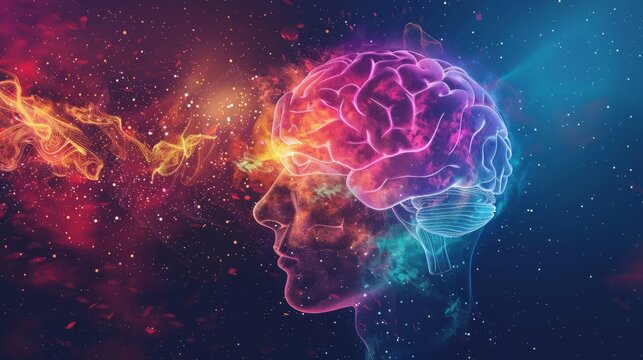Imagine being able to easily recall names, numbers, and vital information without frustration or stress. In today’s high-speed, mentally demanding world, memory is more than just a convenience—it’s a core asset to mental health, confidence, and lifelong learning.
Memory strength isn’t a rare gift—it’s a learned skill. While ancient wisdom has long offered tools for strengthening memory, modern neuroscience confirms what traditional systems have practiced for centuries: with the right techniques, lifestyle, and botanical support, we can train the brain to operate with clarity, retention, and remarkable recall.
This guide blends proven memory enhancement techniques with evidence-based botanical allies to help you build a resilient, high-performing mind.
Understanding How Memory Works
Memory is a system, not a singular function. It involves three primary processes:
Encoding (taking in information)
Storage (maintaining information)
Retrieval (recalling information when needed)
These processes are influenced by:
Quality of sleep
Emotional state and stress levels
Nutritional and hormonal balance
Brain oxygenation and blood flow
Neurotransmitter activity (especially acetylcholine and dopamine)
Strengthening memory is about supporting these functions holistically—from how you focus your mind to how you nourish your body.
Foundational Memory Techniques: Training the Mind
1. Visualization and Association
The brain remembers images far better than abstract data. Vivid, exaggerated, and unusual mental pictures make information “stick.”
For example, to remember someone named “Baker,” imagine them in a giant chef’s hat pulling bread out of an oven. The stranger and more emotional the image, the more likely it will be remembered.
2. The Linking Technique
This method creates a mental story by connecting pieces of information through visual scenes. If you need to remember apples, milk, bread, and eggs, picture a giant apple surfing on a wave of milk crashing into a bread mountain that bursts into flying eggs. Ridiculous? Yes—and that’s why it works.
3. The Memory Palace
Used by ancient Greek orators, this technique involves placing items you want to remember in specific locations within an imaginary building (e.g., your home). As you walk through this “palace,” you retrieve information spatially—an approach validated by modern brain imaging studies.
4. Focused Attention
In most cases, forgetfulness stems from distraction, not poor memory. Take a few moments to clear your mind and bring your full attention to new information. Even 10 seconds of focused observation can lock in memory.
5. 30-Day Daily Training
Memory is like a muscle—consistency trumps intensity. Spend 10–15 minutes daily practicing memory techniques like visualization, list-building, or mental storytelling. Over a few weeks, you’ll see significant improvement in recall and mental clarity.
Lifestyle Strategies for Cognitive Vitality
Sleep & Memory Consolidation
Deep, restorative sleep is essential for transferring short-term memories into long-term storage. A 2013 Nature Reviews Neuroscience article shows how sleep strengthens synaptic connections involved in learning and recall.
Mindfulness and Movement
Practices like Qi Gong, Tai Chi, and breathwork reduce cortisol, calm the nervous system, and improve blood flow to the brain. A 2017 meta-analysis in Frontiers in Aging Neuroscience found that Tai Chi enhanced memory and executive function in older adults.
Diet and Blood Sugar Balance
Erratic blood sugar levels impair focus and memory. A diet rich in healthy fats (e.g., omega-3s), leafy greens, berries, and whole grains supports neurotransmitter function and reduces brain fog.
Botanical Allies for Memory Enhancement
Herbal medicine systems—Ayurveda, Traditional Chinese Medicine, and Western herbalism—have long included plants known to improve cognitive function. Today, clinical studies are beginning to confirm what ancient healers knew intuitively.
1. Bacopa monnieri (Brahmi)
Use: Ayurvedic medhya rasayana (mind rejuvenator)
Effect: Enhances learning, memory retention, and mental processing speed
Science: A 2001 study in Psychopharmacology found Bacopa significantly improved memory acquisition in healthy adults
Mechanism: Antioxidant, supports acetylcholine, reduces neural inflammation
2. Ginkgo biloba
Use: Increases blood flow in Traditional Chinese Medicine
Effect: Supports memory and cognitive performance, especially in aging
Science: A 2016 meta-analysis in Journal of Pharmaceutical Health Care and Sciences showed improvements in cognitive function
Mechanism: Enhances cerebral circulation, antioxidant effects
3. Panax ginseng
Use: Qi tonic in East Asian medicine
Effect: Improves mental stamina and working memory
Science: A 2013 clinical trial in American Journal of Chinese Medicine showed measurable improvements in memory tasks
Mechanism: Boosts neurotransmitter function and energy metabolism
4. Lion’s Mane (Hericium erinaceus)
Use: Nervous system tonic in TCM
Effect: Stimulates neurogenesis and may reverse cognitive decline
Science: A 2009 trial in Phytotherapy Research showed improved cognition in mild cognitive impairment
Mechanism: Increases Nerve Growth Factor (NGF), promotes brain cell repair
5. Rosemary (Rosmarinus officinalis)
Use: Culinary herb known for “remembrance”
Effect: Improves mental clarity and alertness
Science: A 2012 study in Therapeutic Advances in Psychopharmacology found rosemary scent enhanced cognitive performance
Mechanism: Contains 1,8-cineole, which modulates neurotransmitter activity
Daily Integration: A Brain-Boosting Routine
Here’s how to bring these practices and herbs into your everyday life:
Morning: Begin your day with a Lion’s Mane or Ginseng supplement. Pair it with 5 minutes of breathwork or light Qi Gong to energize the brain.
Midday: Use the memory palace or linking techniques to remember tasks, clients, or study material. Keep it playful and creative.
Meals: Add rosemary to your cooking and favor whole, low-glycemic foods to stabilize blood sugar.
Evening: Wind down with a calming herbal infusion (e.g., Brahmi or Ginkgo), followed by screen-free time to support deep sleep and memory consolidation.
Your Mind Is Meant to Remember
Memory isn’t something you have or don’t have—it’s something you can shape, train, and support. Through consistent mental training, lifestyle alignment, and herbal support, your capacity to remember becomes sharper, faster, and more resilient.
By integrating ancient traditions, modern techniques, and plant allies, you’ll not only strengthen your memory—you’ll awaken the full potential of your mind.





